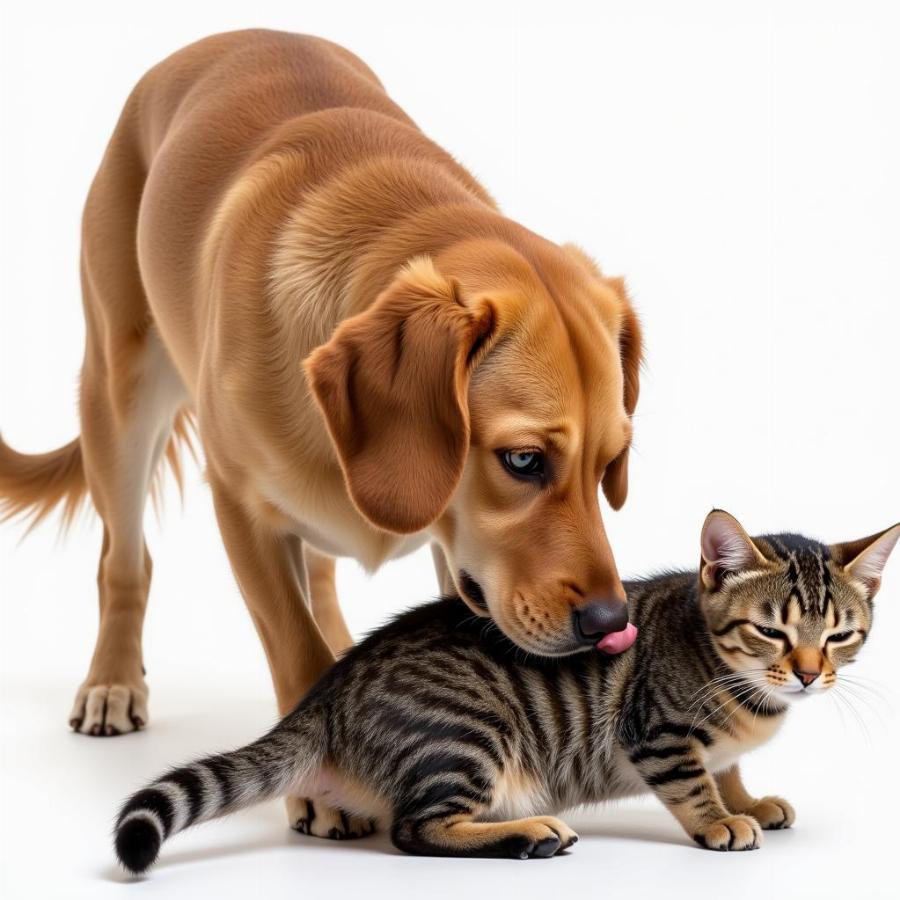If you’ve ever witnessed your dog licking your cat, you’ve likely wondered about the meaning behind this seemingly odd behavior. “Why does my dog lick my cat?” is a common question among pet owners, and the answer isn’t always straightforward. Dog licking can stem from various reasons, from affection and social bonding to stress and even medical issues. Understanding the context and observing your pets’ body language are crucial to deciphering this fascinating interspecies interaction.
Decoding the Lick: Possible Reasons Behind Your Dog’s Behavior
There are several reasons why your dog might be licking your cat. Identifying the correct reason involves careful observation of their interactions and individual behaviors.
Affection and Social Bonding
Dogs, like humans, express affection through physical touch. Licking can be a sign of affection and a way for your dog to create a social bond with your cat. This is especially true if the cat seems to tolerate or even enjoy the licking. It’s similar to how dogs lick each other as a form of grooming and bonding. If you see your dog licking your cat gently, and the cat appears relaxed, it’s likely a sign of friendly interaction.
Grooming Instincts
Dogs have a natural instinct to groom themselves and their pack members. This instinct can extend to other pets in the household, including cats. Licking can be a way for your dog to help keep your cat clean, especially if they are close companions. However, excessive grooming might indicate other underlying issues.
Stress or Anxiety
Sometimes, licking can be a displacement behavior, a way for your dog to cope with stress or anxiety. If your dog is licking your cat excessively, especially in situations that are new or unsettling, it could be a sign of underlying anxiety. Pay attention to other signs of stress in your dog, such as panting, pacing, or whining.
Medical Reasons
While less common, medical reasons can also contribute to excessive licking. Allergies, skin irritations, or even neurological issues can cause a dog to lick compulsively. If you notice your dog licking your cat (or other objects) excessively, it’s crucial to consult a veterinarian to rule out any medical conditions.
 Chó liếm mèo quá mức
Chó liếm mèo quá mức
How to Tell If the Licking is a Problem
While some licking is normal, excessive or unwanted licking can be problematic. Watch for signs that the licking is bothering your cat, such as hissing, growling, swatting, or trying to escape. If the cat is clearly uncomfortable, it’s important to intervene and redirect your dog’s attention.
Is Your Cat Enjoying It?
Cats have varying tolerance levels for dog licking. Some cats tolerate it, some enjoy it, and others detest it. Observe your cat’s body language. A relaxed cat might purr, close its eyes, or even lick the dog back. A stressed cat will likely display signs of discomfort, as mentioned earlier. If the cat is clearly unhappy, it’s important to manage the situation.
Managing the Licking Behavior
If your dog’s licking is causing issues, there are steps you can take to manage the behavior.
- Redirection: When you see your dog starting to lick the cat excessively, redirect their attention with a toy or a treat.
- Positive Reinforcement: Reward your dog when they interact with your cat appropriately, without licking.
- Create Separate Spaces: Provide separate areas where your cat can escape from the dog if needed, such as cat trees or high shelves.
- Consult a Professional: If the licking persists despite your efforts, consult a certified dog trainer or veterinary behaviorist for guidance. They can help you address any underlying anxiety or behavioral issues.
Conclusion
Understanding why your dog licks your cat involves paying close attention to their interactions and individual behaviors. While licking can be a sign of affection and social bonding, it can also indicate stress, anxiety, or underlying medical conditions. By observing your pets carefully and taking appropriate action when necessary, you can ensure a peaceful and harmonious multi-pet household. Remember, if you’re concerned about your dog’s licking behavior, don’t hesitate to consult with a veterinarian or a professional dog trainer.
FAQ
- Q: Is it normal for my dog to lick my cat? A: Occasional licking can be a normal part of interspecies interaction, but excessive licking might indicate other issues.
- Q: How can I tell if my cat doesn’t like being licked? A: Look for signs of discomfort, such as hissing, growling, swatting, or trying to escape.
- Q: What should I do if my dog is licking my cat excessively? A: Redirect their attention, use positive reinforcement, and create separate spaces for your cat. Consult a professional if needed.
- Q: Could my dog’s licking be a medical issue? A: While less common, excessive licking can be a symptom of medical conditions. Consult your vet if concerned.
- Q: Can dogs and cats really get along? A: Absolutely! With proper introduction and management, dogs and cats can coexist peacefully and even develop strong bonds.
- Q: Should I let my dog lick my cat’s wounds? A: No, it’s best to prevent a dog from licking a cat’s wounds as it can introduce bacteria and hinder the healing process.
- Q: My dog only licks my cat when I’m around. Why? A: This could be attention-seeking behavior, or your dog might be mimicking your affection towards the cat.
Related Articles on Beaut Dogs
Beaut Dogs: Your Ultimate Resource for Canine Companions
Beaut Dogs is your one-stop shop for all things dog-related, from breed information and care guides to expert advice and product recommendations. We’re passionate about helping you provide the best possible care for your canine companion. When you need assistance, feel free to contact us via Email: [email protected] to get detailed and accurate answers from Beaut Dogs. Visit us at https://beautdogs.com today!